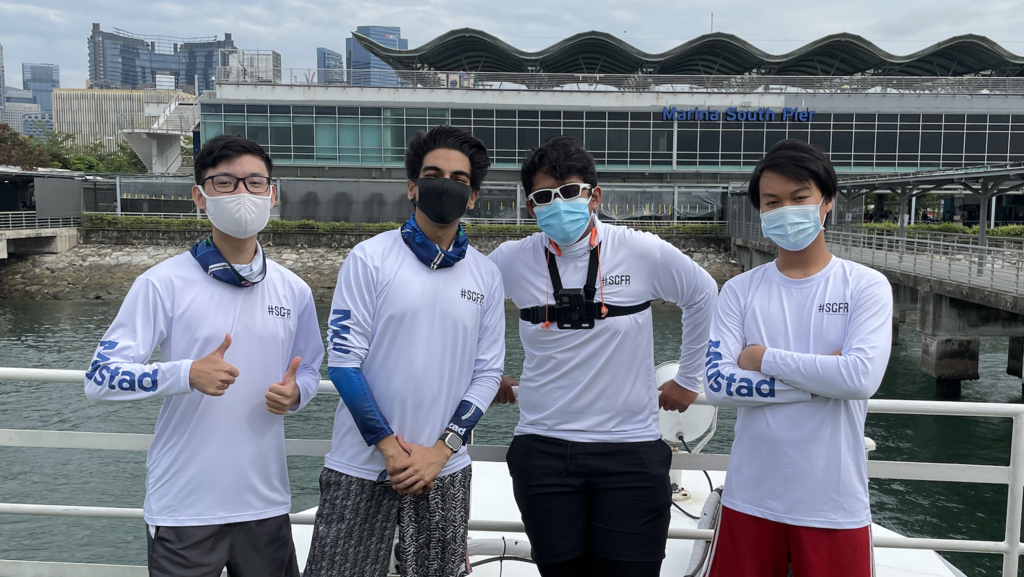TODAYonline: Young anglers spreading message of sustainable fishing through social media and workshops
Published NOVEMBER 21, 2021
SINGAPORE — In a minute-long clip on social media platform TikTok, a presenter explains why it is okay to catch and keep hybrid groupers caught in Singapore waters.

These groupers are an invasive species that eat the food of native species in the ecosystem, says the 16-year-old presenter who is from the United World College of Southeast Asia international school. The presenter, Benjamin Brighton, along with other teenage youth in Singapore are on a mission to transform fishing practices in Singapore — from one that depletes the Republic’s waterways of fish, to one that ensures that water bodies here remain teeming with marine life.
For Benjamin and his other teenage friends who run fishing equipment store SGFishingRigz, social media is just one of several ways they are spreading the sustainability message for a hobby that has become increasingly popular among young Singaporeans during the pandemic.
The team, which is made up of six students aged between 16 and 19, are also developing environmentally friendly fishing equipment.
The 19-year-old had headed down to his fishing haunt at Bedok Jetty to witness a sight he had never encountered. The jetty had become populated with fish as people remained home during the restrictions. But what upset Haikkel, a second-year student at Temasek Polytechnic, was that no one bothered to release juvenile fish back in the sea after reeling them in.
The release of juvenile fish, which are not sexually matured yet, back into the sea to ensure that they are able to grow, reproduce and repopulate the waters is part of sustainable fishing practices. Determined that their business should not promote such practices, the SGFishingRigz team then came up with the idea to sell “catch-and-release” rigs.
These rigs use a circle hook that attaches itself to the corner of the fish’s mouth so that it is easier to release the fish. The more traditional J-hook takes longer to remove from a fish’s mouth, reducing its survival rate before it is released into the water, explained Haikkel. The team is also in the midst of developing fishing sinkers that use bismuth, a metal alloy, in place of the more toxic and environmentally harmful lead. They are being funded by Temasek Polytechnic’s Launchpad incubation programme for new entrepreneurs.
The sinkers, which are used to lower the fish bait in the water, will be trialled during the FishX workshops, available over several dates in December.

The four-hour workshop at Bedok Jetty is the brainchild of Ryan, a Year 5 student in the International Baccalaureate programme at Anglo-Chinese School (Independent).
The workshop was designed in partnership with non-profit Marine Stewards, which promotes sustainable fishing.
Ryan, who is a member of the non-profit, told TODAY that the workshop series aims to let Singaporeans realise Singapore’s marine diversity.
“We have more than 500 marine species, yet most Singaporeans do not know they exist,” said the 17-year-old.
Unlike other anglers who may eat their catch, Ryan said that he fishes to document the biodiversity in Singapore’s waters.
Since the age of 13, he has documented 150 species of marine life in Singapore. He also started to donate samples of fish that are rare or of research interest to the Lee Kong Chian Natural History Museum last year.
And while he has been fishing since the age of six, it was only through attending talks by Marine Stewards in the last year that he came to understand why fish of a certain size should be released back into the sea.
The workshop, which is open to all, will provide participants with hands-on fishing experience, show them sustainable fishing etiquette and teach them how to identify the fish they catch.
Ultimately, promoting a new culture of sustainable fishing “is the heart” of FishX, said Ryan.
“It is always easier to start off on a blank slate, which is why we are looking to talk to new anglers,” he added, noting that experienced hobbyists are more set in their ways.
Echoing the same sentiment, Haikkel added that younger hobbyists are more open to sustainable fishing practices.
“They are very open-minded. They really care about the world,” he said.
Interested participants may sign up for the workshop on Marine Stewards’ website.


